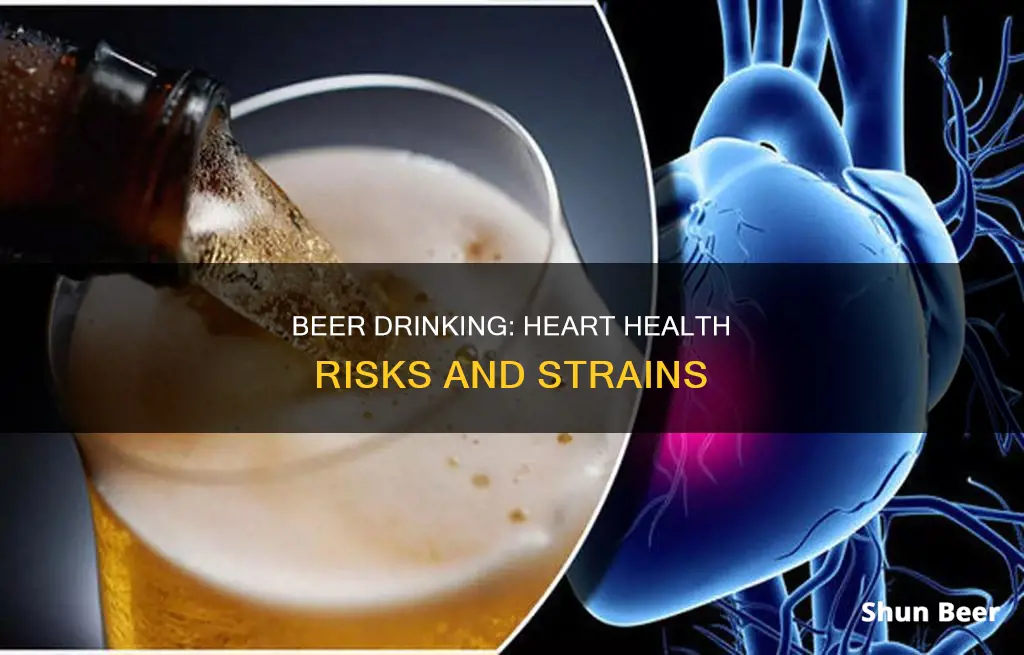
Alcohol is a depressant that slows down the brain's ability to control the body. While one drink may be enough to dilate blood vessels, reducing the amount of blood the heart has to move, two drinks have the opposite effect. The second drink slows down breathing, impacting the amount of oxygen in the blood, and increases activity in the sympathetic nervous system and the amount of blood moving through the heart. This means the heart has to work harder to circulate blood throughout the body, leading to an increased heart rate.
Drinking large quantities of alcohol in a short period can have toxic effects on the heart muscle, causing a disruption in heart rhythm called fibrillation. This is when the heart tries to beat so quickly that it only twitches or quivers, impacting its ability to pump blood effectively.
What You'll Learn

Alcohol raises blood pressure
Drinking alcohol can have a significant impact on blood pressure and heart health. Excessive alcohol intake is linked to high blood pressure, also known as hypertension, which is the most common alcohol-related health problem. Hypertension can lead to serious health complications, including chronic kidney disease and vascular dementia.
When alcohol is consumed, it causes the blood vessels to dilate, which results in the heart having to work harder to circulate blood throughout the body. This increased workload on the heart leads to elevated blood pressure. The more alcohol is consumed, the harder the heart has to work, and the higher the blood pressure becomes. This is especially true for those who engage in binge drinking or long-term heavy drinking.
The American Heart Association recommends limiting alcohol intake to no more than two drinks per day for men and one drink per day for women. These guidelines are crucial to follow, as exceeding these limits can increase the risk of developing hypertension. For those who already have high blood pressure, healthcare professionals may advise cutting back on alcohol consumption.
Excessive alcohol consumption can also lead to other cardiovascular issues, such as cardiomyopathy, a condition where the heart muscle becomes damaged and stretched, affecting its ability to pump blood effectively. This can result in arrhythmias, or irregular heartbeats, and even heart failure. Therefore, it is essential to drink in moderation and be mindful of the impact of alcohol on blood pressure and overall heart health.
Beer and Aspirin: Safe Mix or Health Risk?
You may want to see also

Heavy drinking can lead to heart failure
Heavy drinking is linked to a number of poor health outcomes, including heart conditions. Excessive alcohol intake can lead to high blood pressure, heart failure, or stroke. It can also contribute to cardiomyopathy, a disorder that affects the heart muscle.
Alcohol-induced cardiomyopathy is a condition where long-term heavy alcohol use changes the shape of the heart, causing long-term damage and leading to heart failure and other severe problems. This happens because parts of the heart stretch and enlarge, which weakens the heart muscle and affects its ability to pump blood effectively, reducing the body's available oxygen supply.
The risk of alcohol-induced cardiomyopathy can be reduced by limiting alcohol intake to moderate levels. For women, this means up to seven drinks per week, and for men, it's up to 14 drinks per week. Heavy drinking is defined as more than eight drinks per week for women and more than 15 drinks per week for men.
Heavy drinking can also lead to acute (short-term) problems such as "holiday heart syndrome," where a large quantity of alcohol consumed in a short period can have toxic effects on the heart muscle, causing a disruption in heart rhythm called "fibrillation." This can lead to atrial fibrillation or ventricular fibrillation, both of which are extremely dangerous and can be deadly.
In summary, heavy drinking is a significant risk factor for heart failure and other cardiovascular issues. To maintain heart health, it is crucial to stick to moderate levels of alcohol consumption and not exceed the recommended limits.
Get Rid of Your Beer Gut: Tips for a Trimmer You
You may want to see also

Alcohol affects the nervous system
Alcohol is a central nervous system depressant. This means that it is a drug that slows down brain activity. Even small amounts of alcohol can have this effect, increasing the number of neurotransmitters in the brain that are responsible for slowing down neuron-to-neuron communication. As a result, messages travel more slowly and less frequently to parts of the body controlled by the peripheral nervous system, and also within the brain itself.
Many of the most notable effects of drinking are caused by alcohol's impact on the central nervous system. These include:
- Slowed muscle reactions
- Declining body coordination
- Reduced ability to think clearly or logically
- Impaired memory
- Changes in mood and behaviour
- Impaired self-control
The extent of the impact on normal central nervous system function varies according to factors such as the volume of alcohol consumed, the speed of consumption, the frequency of drinking episodes, the drinker's size and weight, and their genetic background.
Heavy drinking over a long period of time can cause serious problems with cognition and memory. Alcohol interacts with the brain's receptors, interfering with the communication between nerve cells and suppressing excitatory nerve pathway activity. This can lead to neuro-cognitive deficits, neuronal injury, and neurodegeneration.
In addition, people who drink heavily can experience serious or severe changes in their nervous system health, including a condition called alcoholic neuropathy, which is the medical term for nerve damage. Potential symptoms of alcoholic neuropathy include pain, numbness, and tingling in the extremities; muscle cramping, spasming, or weakness; an altered ability to talk or swallow; bladder and urination problems; abnormal changes in bowel function; and an unusual inability to tolerate high temperatures.
Drinking Beer in Dishonored: What's the Deal?
You may want to see also

Alcohol increases stress hormones
Alcohol consumption is associated with cardiovascular disease and various heart conditions, including high blood pressure, stroke, cardiomyopathy, arrhythmias, and heart failure. But does drinking beer strain your heart?
Chronic drinking has been linked to high levels of the stress hormone cortisol. Cortisol is produced by the adrenal glands and is the body's primary glucocorticoid. It is secreted by the adrenal gland, which is part of the hypothalamic-pituitary-adrenal (HPA) axis. It is typically released during periods of high stress to help the individual cope with stressful situations.
Research has shown that alcohol consumption increases cortisol levels, not only while the person is intoxicated but also during alcohol withdrawal. High cortisol levels can increase your risk of health issues such as high blood pressure, diabetes, weight gain, cardiovascular disease, gastrointestinal problems, poor immunity, fatigue, and fertility problems.
A study conducted in 2018 found that stress and alcohol cue contexts led to significantly greater alcohol intake across both groups of binge/heavy (BH) and moderate (MD) social drinkers. The BH group showed significantly lower cortisol responses than the MD group, and blunted cortisol responses to cues predicted greater alcohol intake in the stress condition for the BH group and in the alcohol cue condition for the MD group. Higher alcohol intake predicted greater cortisol response and higher craving post-alcohol.
Another review found that the body's stress response and cortisol levels are affected by withdrawal from alcohol. Transitioning from alcoholism to abstinence is a shock to the system and can lead to the degeneration of the brain's neurons. Among those with alcohol use disorder, those who displayed the most severe cognitive impairments during withdrawal had the highest cortisol levels.
Alcoholism can lead to increased cortisol levels in the body over time. This can be problematic because cortisol can temporarily shut down other bodily functions, potentially causing physical damage. For example, cortisol secretion results in increased heart rate and blood pressure and the temporary shutdown of metabolic processes such as digestion, reproduction, growth, and immunity as a means of conserving energy for the stress response. Chronic release of cortisol over extended periods can result in accelerated neural degeneration during aging and an impaired immune system.
Therefore, while alcohol is often used as a way to cope with stress, it can also create more stress in a person's life by increasing cortisol levels, which are already elevated during periods of stress and withdrawal.
Lemmy Kilmister's Unquenchable Thirst for Beer
You may want to see also

Alcohol can cause an irregular heartbeat
Drinking alcohol can have a range of impacts on your heart health, and one of the most significant concerns is its link to irregular heartbeats, also known as arrhythmias. This condition can have serious consequences, including an increased risk of stroke, heart attack, and heart failure. So how exactly does alcohol contribute to this issue, and what can be done to mitigate the risks?
Understanding Arrhythmias
Arrhythmias refer to abnormal heart rhythms, which can range from a slightly faster heartbeat to more serious problems like fibrillation. During fibrillation, the heart chambers quiver or twitch instead of beating effectively, disrupting the normal flow of blood and potentially leading to blood clots. This condition can occur in both the upper and lower chambers of the heart, known as atrial fibrillation and ventricular fibrillation, respectively.
The Impact of Alcohol
When you consume alcohol, it affects your cardiovascular system in several ways. Initially, alcohol acts as a depressant, slowing down your brain's ability to control your body, including your speech and movements. However, alcohol consumption also dilates your blood vessels, causing your heart to pump harder and faster to circulate blood throughout your body. This increased workload on your heart can lead to an elevated heart rate.
Additionally, alcohol consumption can slow down your breathing, further impacting the amount of oxygen in your blood. With each additional drink, the effects become more pronounced, and the sympathetic nervous system becomes more active, increasing the amount of blood flowing through the heart. As a result, your heart has to work even harder to compensate for the amount of alcohol in your system.
Binge Drinking and Holiday Heart Syndrome
Binge drinking, defined as consuming four or more drinks for women and five or more drinks for men in a single occasion, can have particularly detrimental effects on heart health. It can trigger an irregular heartbeat, often referred to as "holiday heart syndrome." This term comes from the increased incidence of arrhythmias during holidays when people tend to drink more alcohol. Even if you don't typically drink alcohol, indulging in a few drinks at a holiday party can put you at risk for atrial fibrillation, increasing the chances of a stroke, heart attack, or heart failure.
Managing Your Risk
To maintain heart health and reduce the risk of arrhythmias, it is crucial to drink in moderation or abstain from alcohol altogether. The American Heart Association recommends limiting alcohol consumption to no more than one drink per day for women and two drinks per day for men. Additionally, it is advised to avoid drinking on multiple consecutive days to give your body a break. If you have a history of high blood pressure or other medical conditions, you may need to avoid alcohol completely or limit your consumption to occasional, moderate drinking.
Last Night's Beer: Is It Still Good?
You may want to see also
Frequently asked questions
Drinking beer can put a strain on your heart, especially in large quantities. Alcohol can cause an irregular heartbeat, increased heart rate, and raised blood pressure. It can also lead to long-term heart damage, including alcoholic cardiomyopathy, where the heart changes shape and can no longer pump blood effectively.
Alcoholic cardiomyopathy is a condition caused by long-term heavy alcohol use, where the heart changes shape and becomes enlarged due to stretched and weakened heart muscles. This reduces the heart's ability to pump blood effectively, leading to long-term damage and an increased risk of heart failure.
Excessive alcohol intake is generally defined as more than 14 drinks per week for men and more than 7 drinks per week for women. Binge drinking is also harmful, defined as consuming 4 or more drinks for women and 5 or more drinks for men within a short period.







